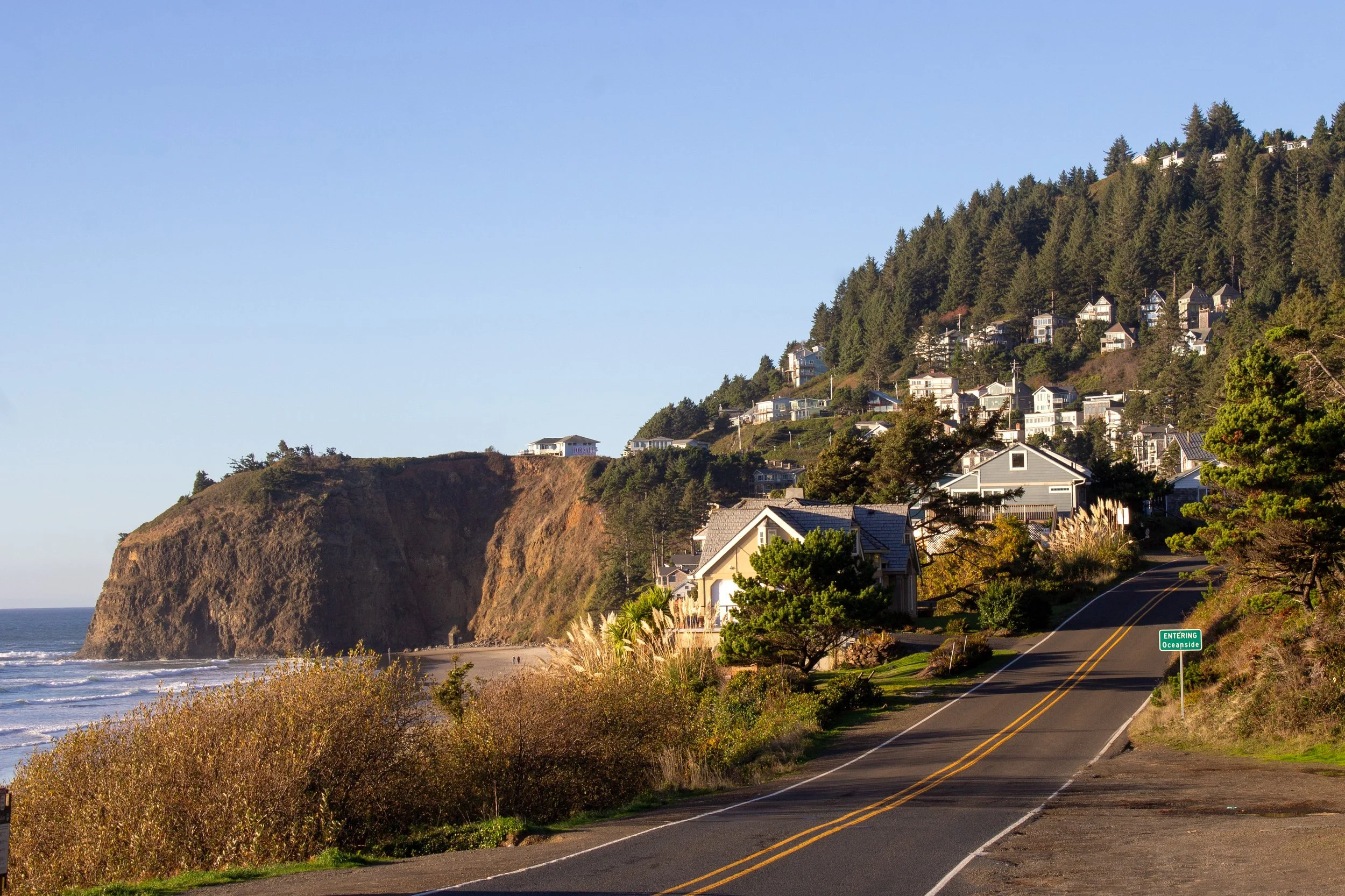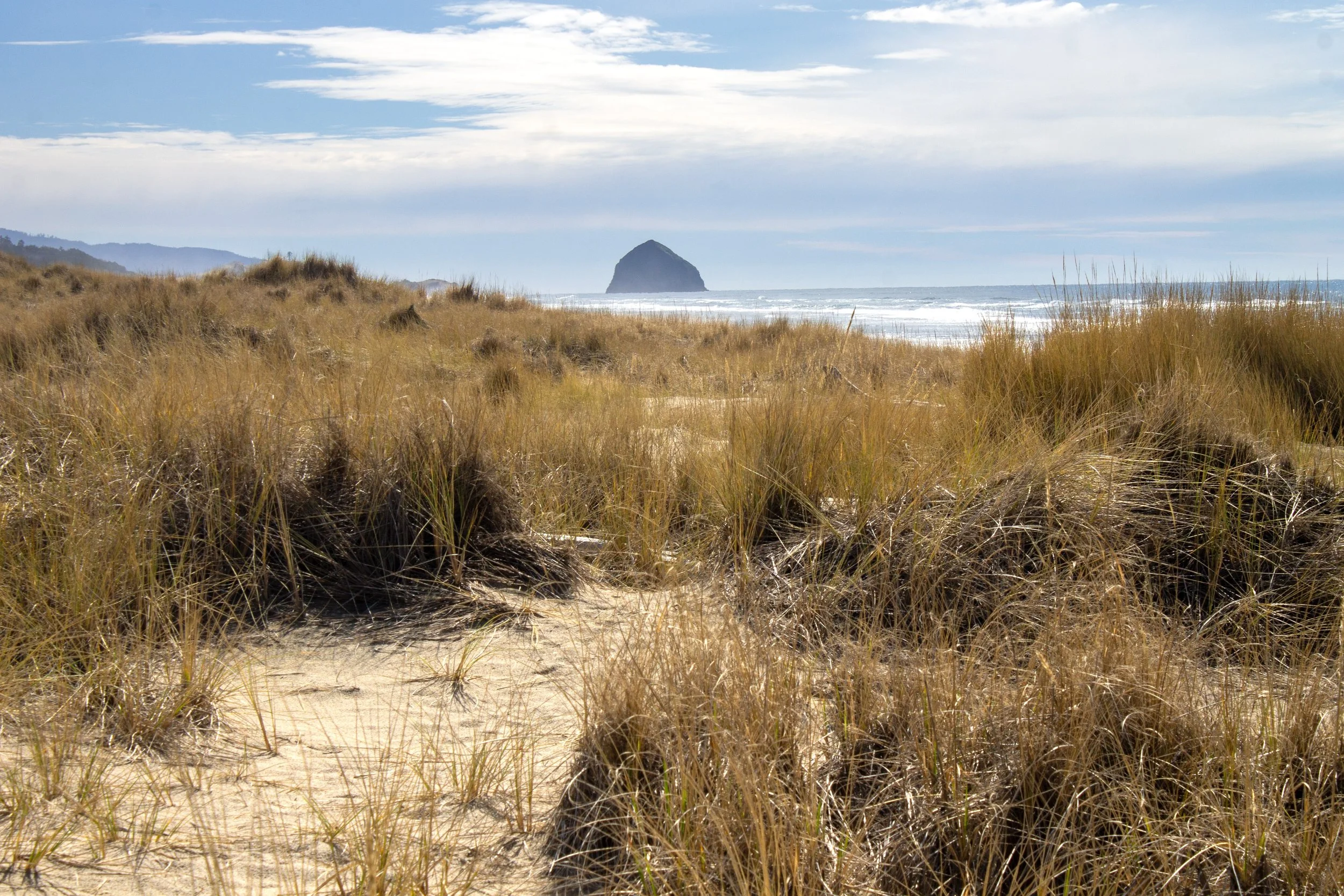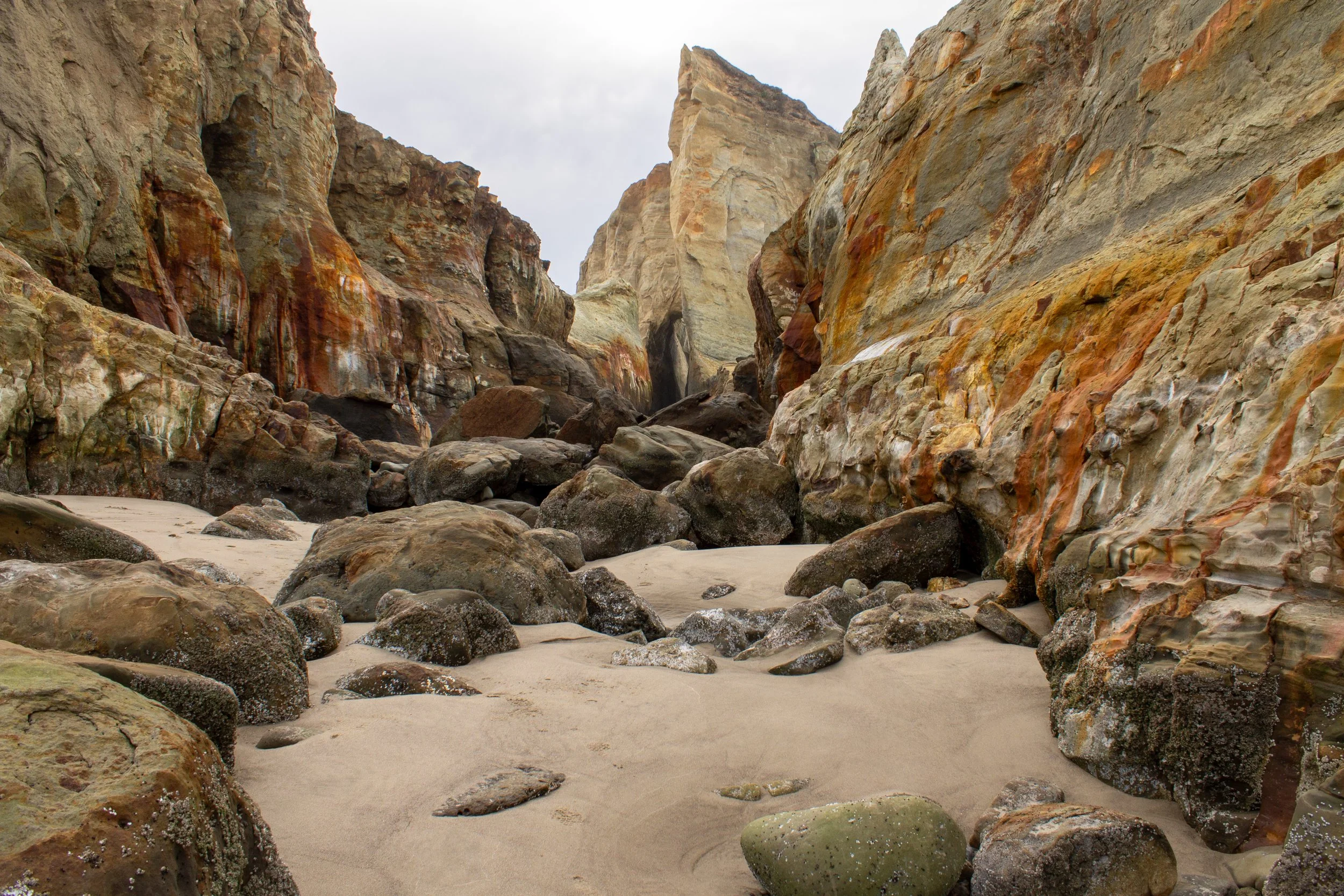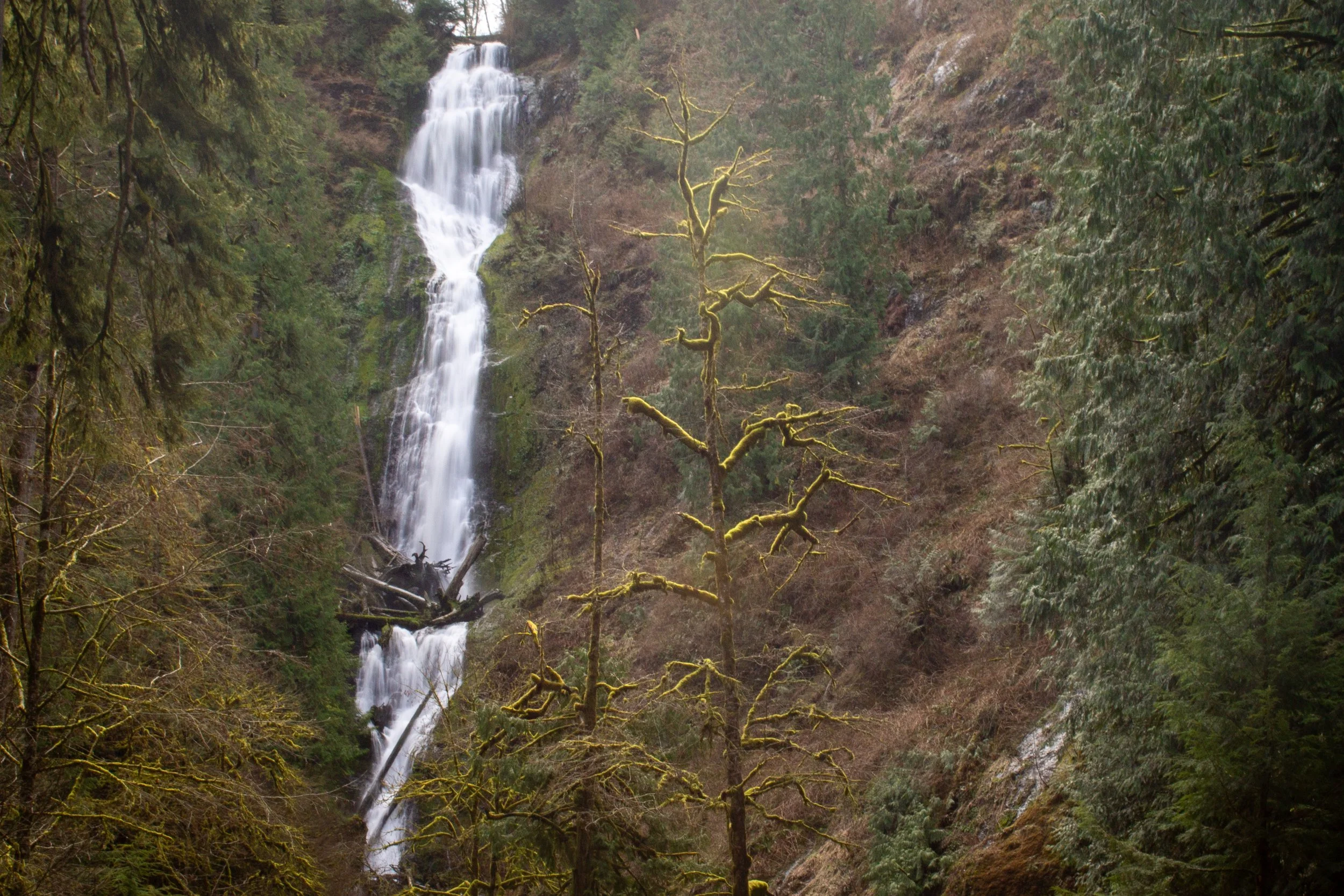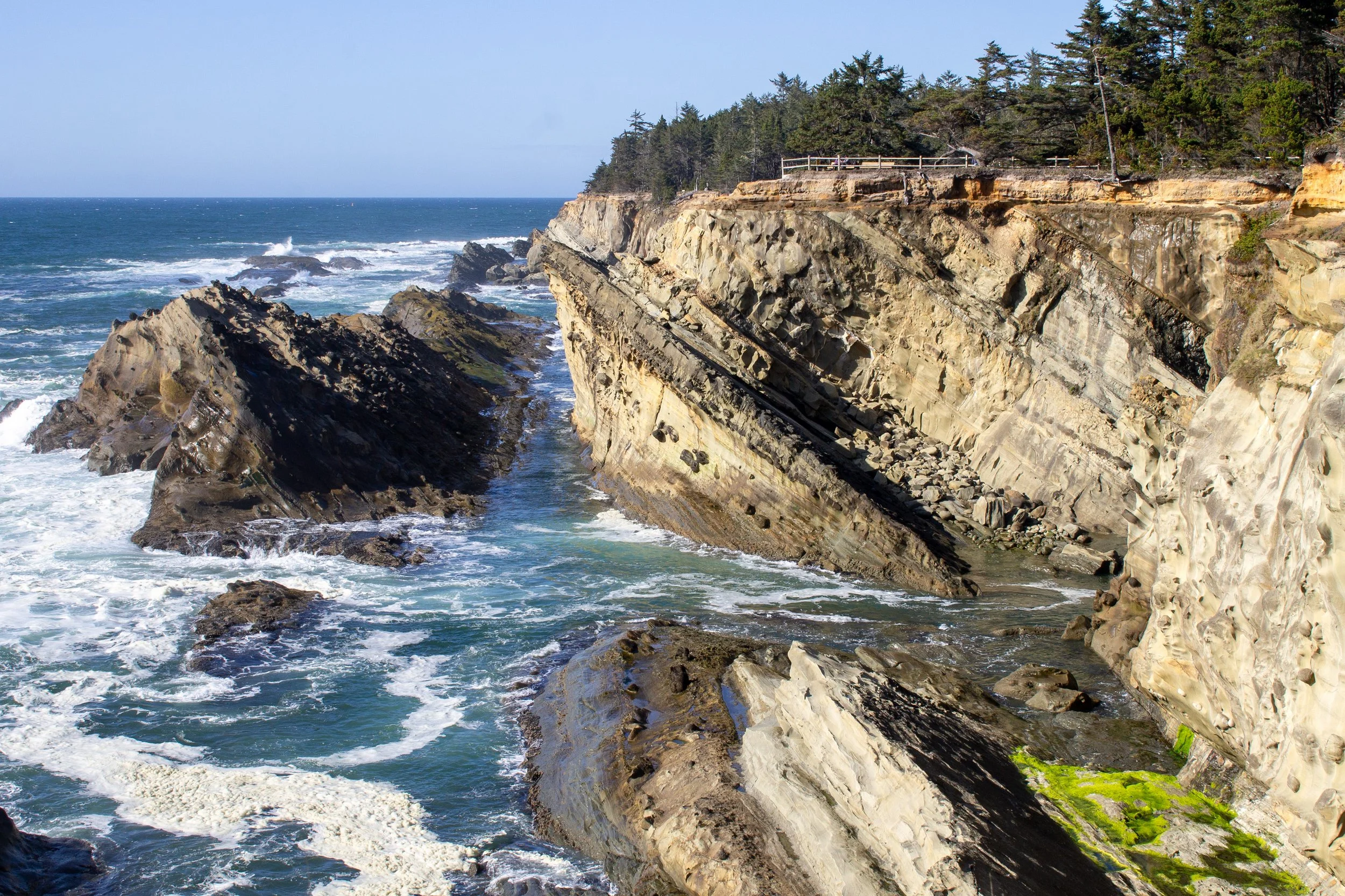Three Capes Scenic Loop
The Three Capes Scenic Loop is one of Oregon’s great road trips. After a decade of closure, the full loop reopened in 2023, back and better than ever. The route connects three stunning capes on the Oregon Coast: Cape Meares, Cape Lookout, and Cape Kiwanda. On the drive, you’ll pass old-growth forests, tranquil bays, and ocean viewpoints. The loop has more potential stops than would fit in a day. I live in Portland and have done this drive many times. Here’s everything you need to know about visiting the three capes, plus my favorite bonus stops.
Route and itinerary
The Three Capes Scenic Loop starts and ends in Tillamook, Oregon. The drive takes about 2 hours without stops. You could do it as a day trip from Portland. The total drive time would be about 5 hours.
The drive has more parks, viewpoints, and hiking trails than would fit in a day trip. If it’s your first visit, I’d prioritize the capes, allowing at least an hour at each. On the map, they’re the dark pink icons. If you have more time, Short Beach, Tunnel Beach, and McPhillips Beach are my favorite bonus stops.
The Three Capes
Cape Meares
Cape Meares Lighthouse
Parking pass: None
Amenities: Restrooms and picnic tables
Dog friendly: Yes
ADA access: Accessible parking and restrooms. Two great viewpoints are next to the parking lot. The trail to the Octopus Tree is unpaved but wide and even with grades up to 8%. The lighthouse trail is paved but steep.
About
Judging by the name, Cape Meares State Scenic Viewpoint sounds like a quick stop where you look at the ocean for a few minutes and then move on. In reality, you could spend half a day here and not see everything. The park has two must-see attractions: the Cape Meares Lighthouse and the Octopus Tree. An easy quarter-mile trail circles the end of the cape, ending at the shortest lighthouse in Oregon. This 38-foot squat little tower is almost entirely lens. It’s unusually cute for a lighthouse, but the views around it are what make it unforgettable. You’ll see 270 degrees of ocean panorama from 200 feet above the waves, making it one of the best spots on the Three Capes Scenic Loop to watch for whales and seabirds.
Octopus Tree
Back at the parking lot, another quarter-mile trail leads to the Octopus Tree. Several hundred years old, this giant Sitka spruce has six arms radiating from its base like the spokes of a wheel rather than a central trunk. A sign by the tree explains how either natural processes or human intervention shaped the tree at some unknown time in history. In other words, we have no idea what’s going on. Just beyond the Octopus Tree is another stunning viewpoint overlooking the coastline to the south. In the distance, you’ll see Cape Lookout, the next stop on the Three Capes Scenic Loop.
Learn more about Cape Meares Scenic Viewpoint.
Cape Lookout
Cape Lookout State Park
CLOSURE PLANNED: Cape Lookout State Park will close in the fall of 2025 until sometime in 2026 for construction. Check the Oregon State Park website before visiting.
Parking pass: Oregon State Park Pass ($10/day or $30/year). You can pay on-site with a credit card.
Amenities: Restrooms, picnic areas, water spigots, and campground
Dog friendly: Yes
ADA access: It’s not great now, but stay tuned. The upcoming construction project includes upgrades for better accessibility.
About
Cape Lookout is easy to spot from dozens of miles away. This narrow peninsula juts out over two miles into the Pacific Ocean, a legacy of lava flows millions of years ago. Cape Lookout State Park sits on the north side of the cape. It’s the best picnic spot on the Three Capes Scenic Loop and one of the best on the Oregon Coast. Tall Sitka spruce trees shade tables perched on the bluff beside the beach. Unlike the few token tables at most parks on the coast, you can find tons of nooks and crannies to sit among the ferns and watch the waves.
Sea cave at Cape Lookout State Park
The beach starts at the base of Cape Lookout and extends for about five miles to the north, ending at the tip of Netarts Spit. In the distance, you’ll see the Three Arch Rocks off the coast of Oceanside. The south end of the beach has some cool sea caves and, at low tide, tidepool critters. Cape Lookout State Park has a large campground with sites ranging from tent sites to deluxe cabins. Book early to stay here. It’s popular and fills up fast.
For an adventurous way to explore Cape Lookout, check out the 5-mile Cape Lookout Trail out to the end of the cape. Unlike the day-use area at the state park, you don’t need a parking pass for the trailhead.
Cape Kiwanda
Cape Kiwanda
Parking pass: Local parking fee, $10/day. You can pay on-site with a credit card.
Amenities: Restrooms
Dog friendly: Yes
ADA access: Accessible parking and restrooms. There’s a good viewpoint overlooking the beach. Beyond the viewpoint, the terrain is sand.
About
When you park by the beach in Pacific City, Haystack Rock draws your eye like a beacon. The surfers bobbing in front of it look like insignificant specks. The basalt monolith towers 327 feet over the waves about a mile offshore. By comparison, Cape Kiwanda looks a little underwhelming at first. It starts as a large dune that transitions to a sandstone headland extending out into the ocean. These cliffs are intriguing, but they don’t become jaw-dropping until you get up close. Weathered, orange-streaked cliffs form giant arches and sea caves. At low tide, the base of the cape has the best tidepools on the Three Capes Scenic Loop. Explore this area with caution and watch for unexpected waves.
Sea arch at low tide
Things get even more interesting if you make the sandy trek up to the top of the cape. More crumbly than most headlands, Cape Kiwanda is one of the fastest-changing landscapes on the Oregon Coast. Waves carve sea caves, channels, and tunnels on a time scale of years rather than millennia. One of the cape’s newest features is a large and growing sinkhole connected to an underground sea cave. Make sure to stay behind the fences while you explore the headland. You’ll still get great views, just without the hazardous conditions.
Learn more about Cape Kiwanda.
Bonus stops on the Three Capes Scenic Loop
Bayocean Spit
Tillamook Bay
Parking pass: $10 local day-use fee. You can pay on-site with a credit card. It’s the same day pass as Cape Kiwanda.
Amenities: Port-a-potty
Dog friendly: Yes
ADA access: I’d say no. The trail is flat but sandy, narrow, and uneven at times.
About
Bayocean Spit is equal parts scenic park and monument to mankind’s hubris. Developers built a swanky resort town on the peninsula at the beginning of the 20th century. The ocean claimed it after the construction of a jetty changed the currents. All traces of the former buildings are gone. It’s now back to its original state, an undeveloped sandy spit with more birds around than people. If you only have one day to see the Three Capes Scenic Loop, I’d skip this stop. It has a quiet beauty but lacks the grandeur and wow factor of many of the places nearby. I also find the $10 day-use fee steep for a quick visit. If you’re spending more time at the Oregon Coast, Bayocean Spit is a lovely place for a walk. You’ll have Tillamook Bay on one side and the ocean on the other. It’s one of the best birdwatching spots on the Three Capes Scenic Loop, especially for shorebirds. Most of the spit is closed to cars, but you can walk to the end, 8 miles round-trip. There’s also a chance for a 4-mile loop around the halfway point.
Short Beach
Short Beach
Parking pass: None
Amenities: None
Dog friendly: Yes
ADA access: No
About
Short Beach is a bit of an open secret on the Oregon Coast. If you’re not looking for it, you’re almost guaranteed to drive by without noticing. The beach access is an unassuming pull-off along the Three Capes Scenic Loop just south of Radar Road. From here, a series of makeshift stairs leads down to a beach of cobbles. Short Beach is one of the more distinctive beaches on the Oregon Coast, one you can recognize instantly with a glance. A manmade waterfall tumbles from a concrete spillway into the ocean. Just offshore is a blobby lump of a sea stack topped with a tiny forest. If you walk north, you can find a natural waterfall near the base of Cape Meares. Keep an eye out as you explore. Short Beach is a great place to find agates and jasper.
Learn more about Short Beach.
Oceanside and Tunnel Beach
Tunnel Beach
Parking pass: None
Amenities: Restrooms
Dog friendly: Yes
ADA access: Accessible parking and restrooms. You can see Oceanside Beach from the parking lot. The beach is sand and cobbles.
About
At first glance, Oceanside Beach looks like a lot of other beaches on the Oregon Coast. It has a tall headland on one side and miles of sand on the other. Don’t get me wrong, it’s beautiful, just not particularly unusual. At least, until you see the tunnel. Maxwell Point is the name of the headland at the north end of the beach. At its base is the entrance to an underground tunnel that connects Oceanside Beach to Tunnel Beach. Owners of a resort in Oceanside built the tunnel in 1926 as a tourist attraction. The resort is gone, but the tunnel remains. Passage can be a bit tricky. Waves drag in rocks and driftwood during storms. It’s also dark. If you stumble through with the help of a cell phone flashlight, you’ll find a stunning and secluded beach on the other side. Besides the great scenery, Tunnel Beach is one of the best rockhounding spots on the Three Capes Scenic Loop.
Learn more about Tunnel Beach.
Sitka Sedge State Natural Area
Haystack Rock from Sitka Sedge State Natural Area
Parking pass: None
Amenities: Restrooms and picnic tables at the parking lot.
Dog friendly: Yes
ADA access: Accessible parking, restrooms, and picnic tables. The first half mile of the trail is unpaved, but flat and even. After that, it gets narrow and uneven.
About
Sitka Sedge State Natural Area is somewhere I’d only visit if I had a little time to spend there, say at least an hour. It lacks the instant gratification of beach access right next to the parking lot, but instead brings you through several different worlds before arriving at a beach that’s been deserted whenever I’ve visited. The trail starts along a tidal marshland full of birds like herons, egrets, mergansers, buffleheads, loons, and sandpipers. It passes through a dense coastal forest and ends at a sandy beach between Cape Lookout and Cape Kiwanda. Unlike either of the capes, you have a good chance of solitude when you reach it. The shortest route to the beach is a flat and easy 1.5-mile out-and-back trail. If you take the long way, it’s a 3.5-mile lollipop loop.
Learn more about Sitka Sedge State Natural Area.
McPhillips Beach
North side of Cape Kiwanda
Parking pass: None
Amenities: Port-a-potty
Dog friendly: Yes
ADA access: No
About
McPhillips Beach is one of my favorite hidden gems on the Oregon Coast. It’s on the north side of Cape Kiwanda, which gets a tiny fraction of visitors compared to the famous south side. A discreet entrance helps keep this beach obscure. It’s an unmarked left turn about a mile north of the big public parking lot in the middle of Pacific City. To find the best scenery, walk south on McPhillips Beach for about a mile. It ends at towering sandstone cliffs decorated with dramatic rust-red streaks. Visit at low tide if you can. It’s safer to explore the cliffs up close, and you can find some anemones in the rocks. Boulders piled at the base of the cape form a natural dam that allows you to stand below sea level on the beach. Beyond the rock dam is a cool sea arch.
Learn more about McPhillips Beach.
Munson Creek Falls
Munson Creek Falls
Parking pass: None
Amenities: None
Dog friendly: Yes
ADA access: No
About
Munson Creek Falls is one of the most impressive waterfalls in Oregon that (almost) no one visits. The road to the trailhead is a short detour from Highway 101 as you finish the Three Capes Scenic Loop. It’s unpaved and bumpy, but doable in any kind of car. From here, a short and easy hike follows a cascading creek through a mossy old-growth forest. It ends at the 319-foot, many-tiered Munson Creek Falls. It’s hard to capture the scale of this waterfall in pictures. Giant logs stacked on one of its tiers look like toothpicks amid the grand scale of the forest. The trail is 0.6 miles out and back and mostly flat with some stairs.
Where to Eat on the Three Capes Scenic Loop
Pelican Brewing in Pacific City
The Three Capes Scenic Loop passes through a few small coastal towns. They have some nice restaurants, but check the hours before visiting. Some are only open a few days a week.
In Oceanside, Roseanna’s Cafe is a cozy and laid-back spot with windows overlooking Oceanside Beach. It’s a 10/10 for ambiance. I had a nice pasta dish years ago. On a more recent visit, they didn’t have any vegetarian food. Mostly just a me problem.
Netarts has one of my favorite restaurants on the Oregon Coast, the Schooner. Great drinks and food made with a lot of seasonal ingredients. I’ve always been able to eat outside, even when the weather is iffy. The large patio is covered and has wind screens and heaters. It looks out onto Netarts Bay.
Pelican Brewing in Pacific City is on the pricier side ($20-30 an entree), but it’s a treat if you can swing it. The restaurant overlooks the beach in Pacific City, with views of Haystack Rock and Cape Kiwanda. Inside are large windows. Outside is a covered patio with heaters. The food and drinks are good. Think upscale pub food and craft beer.
Having a picnic by the beach is one of the best things to do on the Three Capes Scenic Loop. Cape Meares and Cape Lookout State Parks have tables overlooking the ocean. Stock up on supplies in Tillamook before heading out.
Enjoy your drive on the Three Capes Scenic Loop!
With love,
Emma
Explore nearby
Make a short detour on the Three Capes Scenic Loop to visit the Neskowin Ghost Forest.
Visit the most beautiful beaches on the Oregon Coast.
The Cape Arago Scenic Highway is another incredible Oregon Coast road trip.


